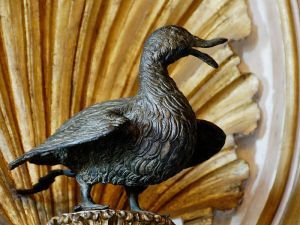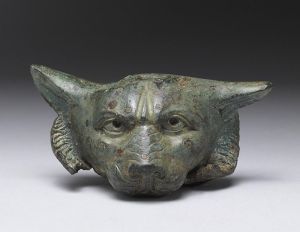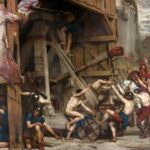Chapters
Supplicia canum (“punishment of the dogs”) was an annual sacrifice in the Roman religion that involved hanging live dogs on the cross (crux) or pitchfork (furca), who were later paraded along the streets of the city. There seems to be no specific date for this feast, however, a late source (John Lydos, De mensibus, 4.114) places it on August 3.
During the procession, geese were dressed in gold and purple, cared for and treated with honour. Ancient sources trying to explain the phenomenon of this holiday date back to the time when, according to the legend of geese, they saved the city of Rome from total disaster. The Capitoline Hill was the only part of the city of Rome to resist the invasion of the Gauls from the Po Valley in 390 BCE. The Gauls decided to conquer the hill at night. For this purpose, they chose the steepest approach and the moment when the defenders, tired of prolonged fights and hunger, fell asleep. The geese, birds dedicated to the goddess Juno, had warned them about the enemy’s approach. The attack was repulsed. The defenders not only defended the hill but drove the enemy out of Rome. In memory of this event, the ancient Romans carried one of the geese in a litter. Dogs that fell asleep with people were punished (one of them was hanged). This disgrace on the part of the guard dogs was to so violate the confidence of the Romans that every year, as a punishment, they were hanged for disobedience.
According to Pliny the Elder (1st century CE) dogs were hung on a cross (crux). The Roman grammarian – Servius (4th century CE) claims that the forks in the shape of the letter Y were used to punish animals. It is possible that the disagreement is due to the fact that Constantine the Great, the first emperor to be baptized, in the 4th century CE forbade crossbreeding.
The procession path passed the temples of Iuventas (“Youth”) and Summanus, the god of night lightning – sometimes identified with Jupiter. The procession is believed to have ended in Circus Maximus.
Dog in culture
Dogs and their body parts possessed numerous magical and healing powers in the Greco-Roman culture. The “quadrupeds” were the companions of Lar – the guardian deities of home and domestic happiness, protecting from misfortunes. They could not be touched or spoken by Flamen Dialis, the high priest of Jupiter.
Dog sacrifices in Rome were also made during the spring festival Robigalia, which was celebrated on April 25. According to tradition, Robigo was the deity responsible for securing crops against the so-called grain rust which destroyed huge amounts of fields. During the Robigalia, the retinue of the faithful went to the sacred grove, where flamen Quirinalissacrificed a red dog and sheep. Then races were organized in honour of the deity.








